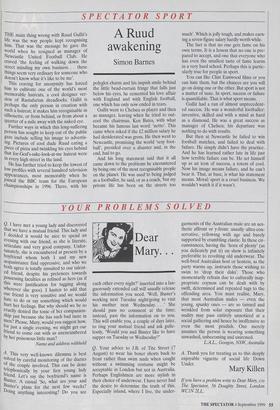SPECTATOR SPORT
A Ruud awakening
Simon Barnes
THE main thing wrong with Ruud Gullit's life was the way people kept recognising him. That was the message he gave the world when he resigned as manager of Newcastle United Football Club. He craved 'the feeling of walking down the street minding my own business. . . these things seem very ordinary for someone who doesn't know what it's like to be me'.
This craving for anonymity has forced him to cultivate one of the world's most memorable haircuts, a cool designer ver- sion of Rastafarian dreadlocks. Gullit is perhaps the only person in creation with such a haircut; it makes him recognisable in silhouette, or from behind, or from about a quarter of a mile away with the naked eye. Further ways in which this long-suffering person has sought to keep out of the public gaze include selling his image to advertis- ing. Pictures of cool dude Ruud eating a piece of pizza and twinkling his eyes behind that for-God's-sake-look-at-me haircut were in every high street in the land. He has further tried to keep the lowest of low profiles with several hundred television appearances, most memorably when he Joined the BBC team for the European championships in 1996. There, with his polyglot charm and his impish smile behind the little bead-curtain fringe that falls just below his eyes, he cemented his love affair with England and with English football, one which has only now ended in tears.
Guilt went to Chelsea as player and then as manager, leaving when he tried to out- cool the chairman, Ken Bates, with what became his famous last word: 'netto'. This came when asked if the £2 million salary he had desiderated was gross. He then went to Newcastle, promising the world 'sexy foot- ball', presided over a disaster and, in the end, had to go.
And his long statement said that it all came down to the problems he encountered by being one of the most recognisable people on the planet. He was used to being judged as a footballer, he said, or as a coach, 'but my private life has been on the streets too much'. Which is jolly tough, and makes earn- ing a seven-figure salary hardly worth while.
The fact is that no one gets fame on his own terms. It is a lesson that no one is pre- pared to accept, and one that everyone who has even the smallest taste of fame learns in a very hard school. Perhaps this is partic- ularly true for people in sport.
You can like Clint Eastwood films or you can hate them, but the chances are you will go on doing one or the other. But sport is not a matter of taste. In sport, success or failure is quantifiable. That is what sport means.
Gullit had a run of almost unprecedent- ed success. He was a wonderful footballer: inventive, skilled and with a mind as hard as a diamond. He was a great success as manager of Chelsea; his departure was nothing to do with results.
But then at Newcastle he failed to win football matches, and failed to deal with failure. He simply didn't have the practice. And he has learned rather late in life just how terrible failure can be. He set himself up as an icon of success, a totem of cool. Now his image means failure, and he can't bear it. That, at base, is what his statement means. Moral: sport is a cruel business. We wouldn't watch it if it wasn't.


























































 Previous page
Previous page